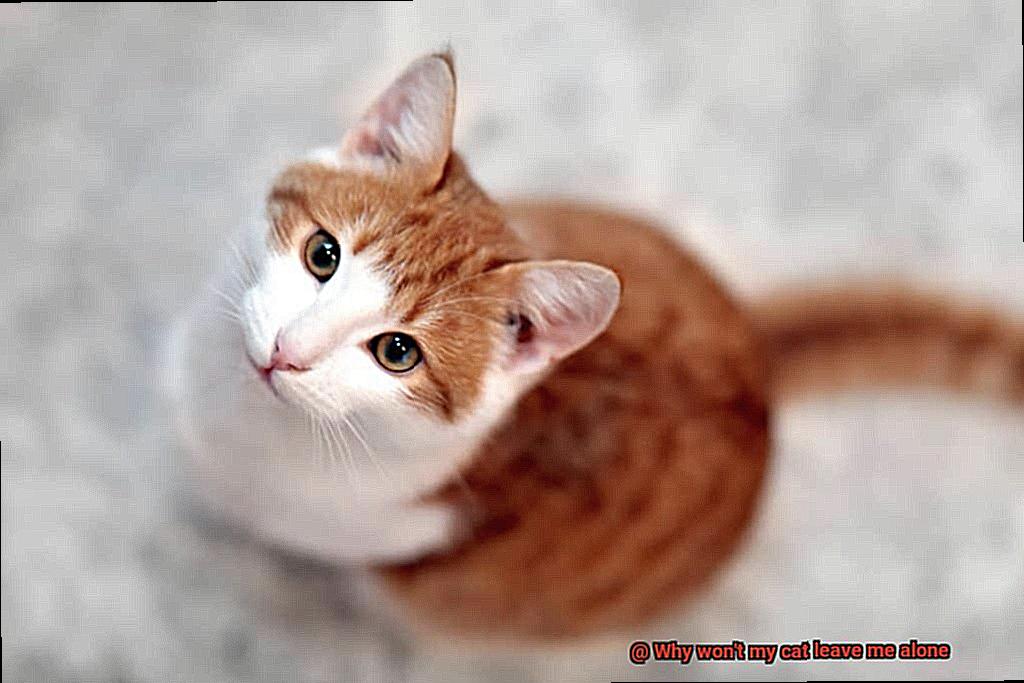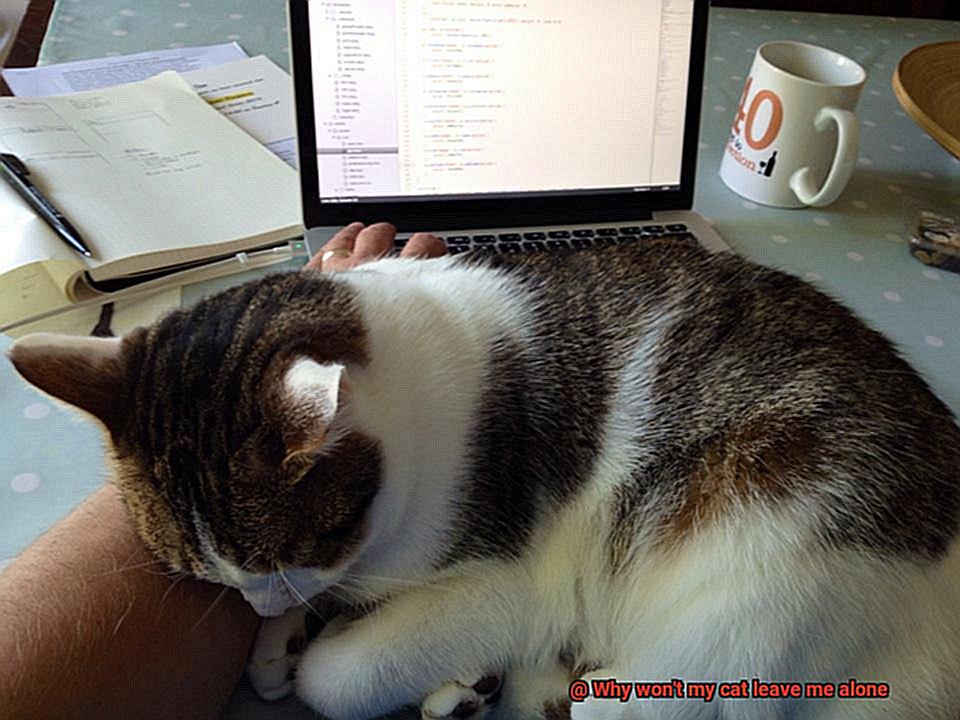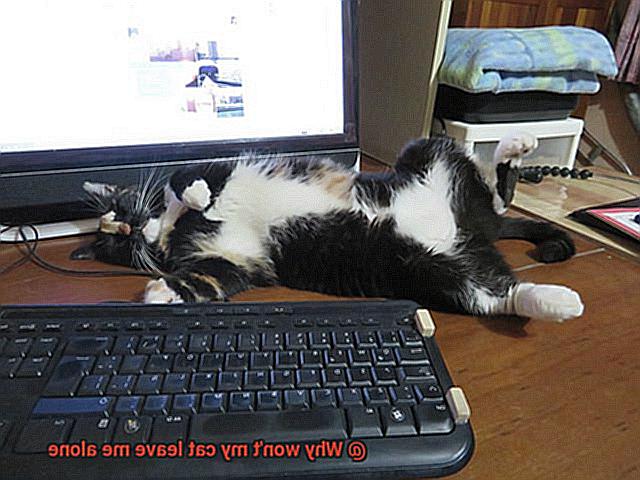Do you have a feline friend that seems to be attached to your hip? Does your cat follow you around relentlessly, meow for attention, and demand constant lap time? It can be both endearing and exasperating to have a clingy cat, but have no fear – this behavior is actually a sign of your cat’s deep affection for you.
Cats are known for their independent streaks, but when they form strong bonds with their owners, they can become quite clingy. You may find them trailing after you from room to room or insisting on being in your lap at all times. But why won’t they leave you alone?
One reason could be separation anxiety. Just like dogs, cats can experience anxiety when separated from their beloved humans. Sticking close to you can provide comfort and security in an uncertain world.
Another factor is your cat’s natural instincts as a predator. They see their owner as the source of food, shelter, and protection – so it makes sense that they want to stay close. By keeping tabs on you at all times, they’re ensuring that their needs are met.
If you’re struggling with a clingy cat, don’t worry – there are ways to manage this behavior. In this blog post, we’ll delve deeper into the reasons behind it and offer tips on how to keep your cat content without sacrificing your own space. So if you’re ready to learn more about why your furry friend won’t give you any alone time, keep reading.
Reasons Why Cats Cling to Their Owners
Cats are known for their independent nature, but that doesn’t mean they don’t crave attention and affection from their owners. In fact, many cats are known to follow their owners around the house, meowing for attention, and curling up on laps for cuddles. So why do cats cling to their owners? As an expert on feline behavior, I’m here to explain the top 5 reasons behind this behavior.
Seeking Security and Comfort
One of the main reasons why cats may cling to their owners is that they feel safe and secure around them. Cats are instinctually wary of new people and environments, so they often turn to their owners for comfort and protection. By rubbing against their owner’s legs or sleeping on their lap, cats are essentially saying “I trust you and feel safe around you.” This behavior is especially common in kittens who have a natural need for physical closeness and warmth.
Attention-Seeking Behavior
Cats are intelligent animals that quickly learn which behaviors will result in attention and affection from their owners. A cat that meows or rubs against its owner’s legs may receive a positive response, which reinforces the behavior and encourages them to repeat it in the future. Some cats may even follow their owners around just for the sake of getting attention. This behavior can be endearing, but it’s important for owners to balance giving attention with setting boundaries.

Separation Anxiety
Just like humans, cats can become attached to certain individuals and feel anxious when separated from them. This behavior is more common in indoor cats who have little exposure to other people or animals outside of their immediate family. If your cat seems particularly clingy when you’re about to leave the house, separation anxiety may be the cause. It’s important to provide a comforting environment with plenty of toys and activities to keep your cat occupied when you’re away.
Territorial Behavior
Cats are known for their territorial nature and may view their owner as part of their territory. By rubbing against their owner or sleeping on their belongings, the cat is marking their scent and asserting their dominance over the area. This behavior is more common in cats that live alone or in small households without other pets.

Boredom or Stimulation
Lastly, some cats may simply be bored or in need of stimulation. If a cat is left alone for long periods of time or doesn’t have enough toys or activities to keep them occupied, they may seek out their owner’s attention as a way to alleviate boredom. It’s important to provide regular playtime and mental stimulation for your cat to prevent this behavior from developing.
Overall, there are several reasons why cats may cling to their owners. Whether it’s for security, attention, or territory, it’s clear that cats value the bond they have with their humans and seek out their attention and affection accordingly.
Anxiety or Stress
If you’ve noticed your cat becoming clingy or meowing excessively, it may be a sign that they’re feeling uneasy.
There are several reasons why a cat may be experiencing anxiety or stress, such as changes in their environment or illness. Cats thrive on routine, so any disruptions to their daily schedule can leave them feeling vulnerable and anxious.

To help your feline friend feel more relaxed and comfortable, it’s essential to provide them with a calm and secure environment. You can achieve this by creating hiding spots around the house, such as cozy cat beds or cardboard boxes. Cats also love to climb and explore vertical spaces, so consider installing shelves or providing access to high places like window sills.
Maintaining a consistent routine for feeding and playtime is also crucial to help your cat feel in control of their surroundings. This can include setting aside designated times for meals and play sessions.
If your cat’s clingy behavior persists, it may be time to consult with a veterinarian or animal behaviorist. They can assess your cat’s situation and develop a plan for managing their anxiety and reducing their clinginess.
Enjoys Your Company
Well, it’s a clear indication that your cat enjoys being around you and feels safe in your presence.
Cats are social creatures and often crave affection and attention from their owners. If your cat is rubbing up against you or purring, these are surefire signs that they enjoy your company. They may even try to sit on your lap while you’re working or meow for your attention.
However, it’s essential to understand that each cat has a unique personality, and some may prefer to spend time alone or seek attention only on their terms. Nevertheless, if your furry friend is constantly seeking your attention, it’s a clear indication that they enjoy being around you and feel comfortable in your presence.
To manage your cat’s desire for attention, provide them with plenty of toys and activities to keep them entertained while you’re busy. Puzzle toys, scratching posts, and interactive toys are great options that allow them to play independently.
Natural Tendencies of Certain Breeds
Well, it could be because of their breed’s natural tendencies. Every cat has a unique personality, but certain breeds may be more likely to seek out affection from their owners.
Take Siamese cats, for example. These vocal felines are known for being demanding and seeking attention. They may follow you around the house, meowing loudly, and rubbing against your legs. On the other hand, Scottish Folds are social and affectionate, often curling up in your lap for hours on end.
For some breeds like Bengals or Abyssinians, being active and playful is in their DNA. They may crave new sources of stimulation and interaction, including from their human companions. Persian cats, however, are more relaxed and comfortable lounging around the house.
It’s essential to remember that while breed tendencies can influence a cat’s behavior, every cat is unique with its own personality and preferences. So don’t worry if your cat doesn’t fit perfectly into these categories.
Weaning Issues

Transitioning your kitten from their mother’s milk to solid food can be a sensitive time that requires a gentle touch. Weaning issues can arise, causing your cat to become clingy and seek comfort from you. But fear not, with some patience and proper care, you can ensure a smooth and healthy transition for your furry friend.
During the weaning process, kittens may experience stress or anxiety, which can lead to clingy behavior. Providing a safe and comfortable environment with soft bedding, toys, and a quiet space for them to retreat to is crucial. This will help them feel secure and supported during this time of change.
Nutrition plays a vital role in the weaning process. Gradually introducing solid foods while ensuring your kitten is receiving proper nutrition is key. A balanced diet that meets their nutritional needs will alleviate any nutritional stress.
Weaning too early or abruptly may result in behavioral issues such as separation anxiety or attention-seeking behavior. If this happens, it’s important to provide training and socialization to help your kitten feel more independent. Positive reinforcement for good behavior and gradually increasing alone time will build their confidence and reduce their need for constant attention from you.
Meeting Your Cat’s Basic Needs
While it may seem cute and cuddly at first, it can quickly become overwhelming, especially when you’re trying to get things done. However, before you get frustrated, consider whether your cat’s behavior is due to unmet basic needs.
Just like us humans, cats have fundamental needs that must be met to live a healthy and happy life. These basic needs include food, water, a clean litter box, exercise and playtime, and a safe and comfortable environment. By fulfilling these requirements, you can reduce your cat’s need for constant attention.
Let’s start with food. It’s crucial to provide your cat with a balanced diet that meets their nutritional needs. Ensure that they always have access to clean water and establish a feeding routine so that they know when to expect their meals. This will help them feel secure and confident in their environment.
Next up, let’s talk about your cat’s litter box. Cats are naturally clean animals, and if their litter box is dirty or in an inconvenient location, they may follow you around seeking attention or trying to communicate their discomfort. Choose a quiet and accessible area for the litter box and keep it clean daily.
Cats also need exercise and playtime to stay healthy and happy. Providing them with toys and scratching posts can keep them entertained and active, reducing their need for constant attention. Interactive playtime with your cat can also help build a bond between you two and increase their sense of security in their environment.
Finally, ensure that your cat has a safe and comfortable environment. Cats seek out places where they feel secure and relaxed. Make sure they have access to cozy beds, comfortable perches, and hiding spots where they can retreat when they need some alone time.
Dedicated Playtime for Your Cat
While it’s heartwarming to have a clingy cat, it’s important to remember that they have basic needs that must be met. One way to address this is by scheduling dedicated playtime with your cat.
Not only is playtime essential for your cat’s physical health, but it’s also a great way to build a stronger bond between you and your pet. Cats are natural hunters, and engaging in play that simulates hunting behavior helps them release pent-up energy and stress. By using toys that stimulate their natural instincts, such as wand toys with feathers or strings attached, you can create an interactive environment that both you and your cat will enjoy.
Setting aside time each day for dedicated playtime is key. This can be as little as 10-15 minutes or as long as 30 minutes, depending on your schedule and your cat’s energy level. During this time, make sure to rotate through different types of toys to keep your cat engaged and interested. Some cats prefer toys they can chase and pounce on, while others prefer toys they can carry in their mouths and bat around.
In addition to varying the types of toys used during playtime, it’s also helpful to try different play styles. Some cats prefer slow and steady play, while others enjoy fast-paced action. Experiment with different techniques like dragging a toy across the floor or bouncing it off walls to see what your cat responds to best.
Dedicated playtime helps keep your cat physically active and mentally stimulated while reducing unwanted behaviors such as excessive meowing or scratching. Moreover, it’s an opportunity for you to bond with your furry friend and strengthen the trust between you.
Seeking Professional Help from a Vet or Animal Behaviorist
While cuddling up with kitty can be comforting, excessive clinginess can become overwhelming and even problematic. When playtime and other techniques fail, it may be time to seek professional help from a veterinarian or animal behaviorist.
These experts have the know-how to assess your cat’s behavior and determine any underlying medical or behavioral issues that could be causing the clinginess. During a physical exam, a veterinarian can rule out potential health concerns such as hyperthyroidism or arthritis that could be making your cat feel more attached than usual.
If no medical issues are found, an animal behaviorist can dig deeper to figure out if there are underlying behavioral problems causing your cat’s clinginess. They may suggest behavior modification techniques or recommend changes in your cat’s environment to reduce stress and anxiety.
While seeking professional help may cost a pretty penny, it is worth it in the long run for both you and your feline’s well-being. Don’t wait until the problem becomes too overwhelming – the earlier you seek help, the easier it may be to correct any problematic behaviors.
uVhUzBtupYI” >
Conclusion
In conclusion, having a cat that won’t leave you alone can be both adorable and tiring. However, it’s important to realize that this behavior is a sign of your cat’s affection for you. There are various reasons why cats become clingy, including separation anxiety, natural predator instincts, seeking attention, boredom or stimulation, and weaning issues.
To manage this behavior effectively, it’s crucial to meet your cat’s basic needs by providing them with a balanced diet, clean litter box, exercise and playtime, and a secure environment. Additionally, scheduling dedicated playtime for your feline friend helps keep them mentally stimulated and physically active while reducing unwanted behaviors.
If your cat continues to be clingy despite these efforts, seeking professional help from a veterinarian or animal behaviorist may be necessary. They can assess your cat’s situation and develop an individualized plan for managing their anxiety and reducing their clinginess.
Remember that every cat has its own unique personality and preferences. So don’t worry if your furry friend doesn’t fit perfectly into the categories mentioned above.







